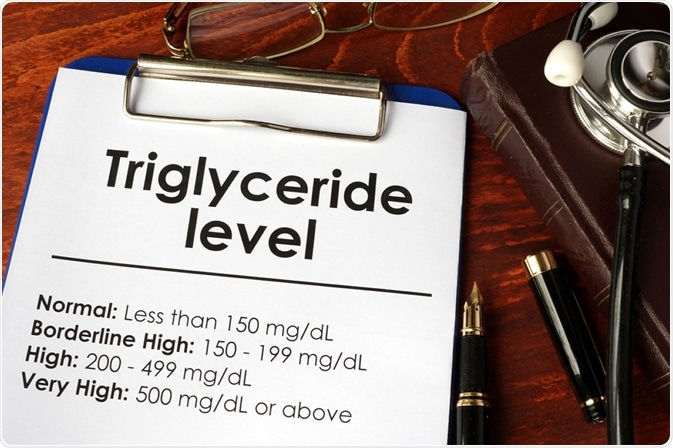Triglycerides are the most common type of fat digested in the body and can be either consumed in the diet or produced in the body. They normally circulate in the bloodstream to supply energy to cells and are stored in body fat as an emergency store of energy.
If there are excessive levels of triglycerides in the body, the level of triglycerides circulating in the bloodstream and stored in body fat elevates and obesity becomes more common. This is also known as hypertriglyceridemia and is linked to an increased risk of other health conditions such as cardiovascular disease.

Image Credit: Vitalii Vodolazskyi / Shutterstock
Chemical Composition
A triglyceride is formed when the three hydroxyls (OH-) groups of a single glycerol molecule react with the carboxyl group (COOH-) of three fatty acids by forming ester bonds.
The three fatty acids included in the triglyceride structure may or may not be the same in different triglycerides, such that there are many possible variations. The length of the fatty acid chains occurring in triglycerides can vary but are most commonly 16, 18, and 20 carbons.
Chemical Metabolism
Triglycerides can be broken down through a reaction involving the pancreatic lipase enzyme responsible for hydrolyzing the ester bonds and allowing the fatty acids to be released from the glycerol molecule.
Triglycerides must be broken down in order to provide the body with energy, as the duodenum cannot absorb lipids in the triglyceride form.
Role in the Body and Disease
Triglycerides are utilized in the body by offering a source of energy to cells that require it. They are a normal component of the blood and are naturally stored in fat deposits. However, triglycerides can cause problems in the body when present in excess and lead to serious diseases.
High levels of triglycerides are associated with a group of disorders collectively known as metabolic syndrome, which increases the risk of an individual being affected by diabetes, stroke or cardiovascular disease.
Normal Physiological Levels
The body needs some triglycerides in the bloodstream as they are utilized as an energy source. Blood tests are usually used to determine the level of triglycerides in the body, and several tests may be required to confirm accurate results.
Triglycerides are measured in mmol/L and are classified as follows:
- Normal: less than 1.7 mmol/L
- Borderline high: 1.7 – 2 mmol/L
- High: 2 – 6 mmol/L
- Very high: more than 6 mmol/L
The blood sample used in the test should be taken after fasting for 12 hours to lessen the impact of recent food consumption on triglyceride levels in the blood.
Causes of High Triglycerides
The most common cause of high triglycerides is habitual overeating. However, some other circumstances may also contribute to increased triglyceride levels, including alcohol consumption, uncontrolled diabetes, hormone abnormalities, medication use, kidney disease, liver disease, and some genetic disorders.
What are Cholesterol and Triglycerides?
References
Further Reading
Last Updated: Apr 8, 2023